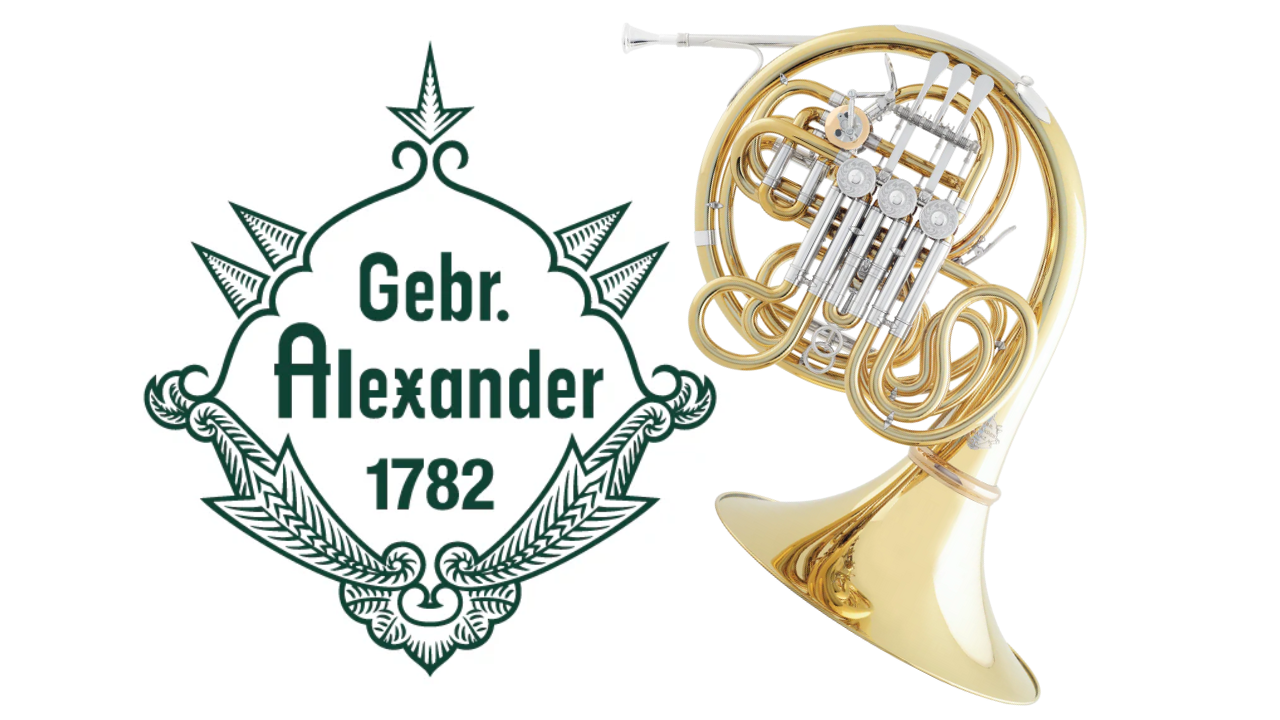Alexander French horns originate from Mainz, Germany, and hold the reputation of the instruments with exceptional craftsmanship and quality. The brand, a family business of seven generation, has been involved in instrument making since 1782. Over the years, the Alexander family has been developing and preserving a tradition of producing high-quality French horns. In this article, we will explore the history of the Alexander brand, the key features of their French horns, the most popular models and the reasons why brass musicians like Alexander French horns so much.
The History of Alexander French Horns
The history of Alexander French horns began in the early 19th century when Franz Ambros Alexander founded the company. Since they started producing French horns, they quickly earned a reputation as respected crafters, whose instruments boasted superior sound and build quality. The Alexander company, over 200 years old, is still owned and directed by the descendants of its founder. Georg Philipp Alexander, the son of Anton Julius Alexander, has been the director of the company since 1999. During this period, the company incorporated many new technologies and pushed their potential in the design of brass instruments, including French horns.
Over the centuries, as seven generations of the Alexander family changed, the manufacturing methods were coming through the modernization, combining traditions with a modern approach with a great focus on technology supports. This allowed the company to elevate the quality of the instruments. Moreover, the brand thoroughly studies the feedbacks from professional musicians and collaborates with the best among them to improve their product lines.
The top priority of the Alexander brand is the combination of traditions and progress. The company regularly receives letters of gratitude from French horn players from different countries that prove the ability of Alexander musical instrument to satisfy artistic needs to the fullest. Alexander French horns can be seen in the world-renowned orchestras, educational institutes and among enthusiasts.
How Alexander French Horns are Created
The company has been creating their French horns since 1782, in Germany. Their genuine handwork results in high-quality instruments ready to meet the needs of beginners, intermediate players and professionals. First, they produced their musical instruments in Mainz, at their headquarters at Bahnhofstrasse. Later, they moved to a new workshop, the current facility that perfectly meets the requirements of modern brass instrument manufacturing.
The process of building French horns includes several stages:
-
Prefabrication. This is where individual parts of the body, such as crooks, leadpipes, and bells, are created and arranged for the further construction process. The company uses yellow and gold brass for this purpose. The process of shaping the components is environmentally friendly. For valve crooks and tapered parts, the company still incorporates decades-old hollow bending irons and mandrels. The instruments are created by qualified and skilled makers.

- Polishing. This is where French horns acquire their eye-catching and shiny look. The masters polish each individual component in advance. The process includes repeated grinding and polishing, both manually and mechanically.
- Lacquering. After French horns undergo through quality checks, they are lacquered to make them glossy.
The company also has a repair department, where specialists fix the problems with instruments sent from various parts of the world.
After French horns are thoroughly checked during the final inspection stage, they are packed and shipped worldwide with additional accessories such as gig bags and hard cases. The company ships their French horns to America, Europe, Asia, and Australia.
The Most Popular Models of Alexander French Horns
These days, the company offers a great variety of horns:
- Descant Horns
- Double Horns
- Single Horns
- Natural Horns
- Triple Horns
They are produced from brass, gold brass and nickel silver.
-
The Alexander 103 model is one of the most iconic instruments, popular in the orchestral settings. This French horn set the standard for many professional horn players. The instrument combines full Bb and F horn features, providing players with flexibility in intonation and tone. Musicians appreciate the 103 model for its excellent performance in solo and orchestral settings, featuring smooth valve action and perfect response across all registers.

-
Alexander 107 model is a double horn, offering B♭, and high F tuning. Being a very versatile instrument, it totally meets the requirements of advanced French horn players. The horn features a lightweight construction, so it’s very comfortable for extended playing sessions and long concerts. Horn players like the 107 Alexander French horn because it’s precise and clear in tone, and provides an easy switching between registers. The instrument is also known for its romantic sound.

-
The Alexander 503 model is similar in design to the Alexander 1103. This double horn fits advanced musicians. The instrument features a medium bell size and an adjustable thumb lever that makes it very flexible and easy to play even for younger horn players.

-
The Alexander 1103 model with a medium large throat also combines the features of full Bb and F horns, and presents an ideal balance of mass and tonal projection. It’s somewhat a modern take on the classic 103 model, which offers even better flexibility and easier performance. The 1103 French horn also boasts its ergonomic design and enhanced projection. Thanks to these features, the instrument is favored by brass players from large ensembles.

Feedbacks from Musicians: Why Alexander French Horns are so Good
Musicians choose Alexander French horns for many years because the instruments combine all the qualities that they want to see in their perfect horn.
- Construction Quality. From their early years of existence, Alexander French horns were known for their high-quality craftsmanship and serious quality checks, resulting in the highest standards of build. Musicians praise the instruments’ solid construction and durability.
- Sound Quality. One of the most frequently cited reasons for buying Alexander horns is their sound, described as romantic, warm and full-bodied, that contributes to the balanced performance. Also, musicians appreciate that the horns’ sound is consistent across all registers.
- Excellent Response and Intonation. Thanks to the smooth valve action and ergonomic design, Alexander French horns are very comfortable to play, even if musicians have extended practice sessions or concerts. A perfect balance of resistance and easy blowing is one of the key factors in why musicians buy Alexander horns.
- Adaptable to Various Contexts. These instruments receive high marks from musicians who are specialized in solo performances, play in chamber ensembles, and large orchestras. This proves that Alexander French horns are easily adaptable to a variety of musical settings. These horns can bring the audience to delight with a wide range of repertoire.
Recap
Since 1782, Alexander French horns hold a special place on the market and in the hearts of musicians who appreciate well-designed construction, easy performance and attractive appearance. With the history of seven generations, the company closely collaborates with musicians from all part of the world to continually improve their brass musical instruments and meet the most demanding professionals’ requirements. Their French horns are perfect for various musical contexts, from solo performance to large orchestras.
Recently, we have also featured an article about Holton French horns. In the near future, we’re planning more articles about famous brands producing French horns. Also, we shared tips on how to care for your French horn.
At our website, you can buy a great variety of accessories for French horns, combining genuine leather, neat design and an availability for personalization.




 https://kgumusic.com/pages/about-us
https://kgumusic.com/pages/about-us